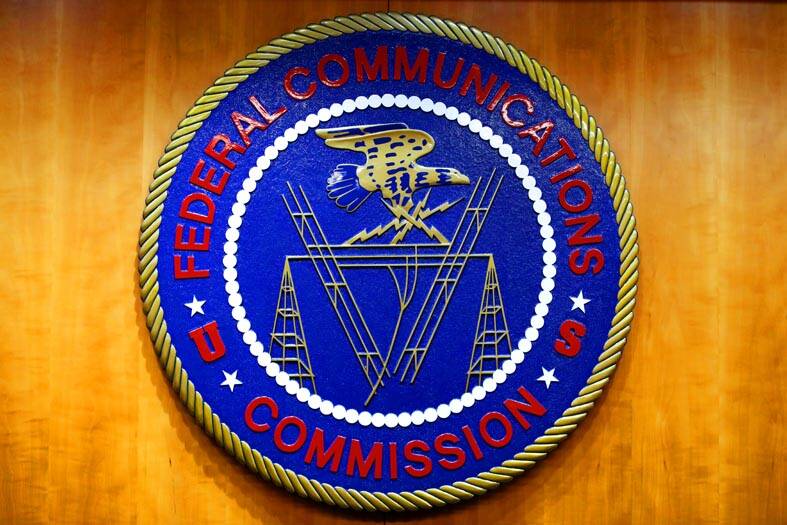The US Federal Communications Commission (FCC) on Thursday ordered the US units of China Telecom Corp (中國電信), China Unicom Hong Kong Ltd (中國聯通) and China Mobile Ltd (中國移動) to discontinue fixed or mobile broadband Internet operations in the US.
The FCC said it was requiring the Chinese carriers to discontinue services within 60 days of the effective date of the net neutrality order approved on Thursday.
The order also applies to Chinese telecom Pacific Networks Corp (太平洋網路) and its wholly owned subsidiary ComNet (USA) LLC.

Photo: AP
The commission previously had barred the companies from providing telecommunications services and those decisions were upheld by US courts.
FCC Chairwoman Jessica Rosenworcel on Thursday said the commission had evidence that Chinese telecoms were providing broadband services in the US.
The FCC cited national security concerns in revoking or denying Chinese companies the right to provide US telecommunications services.
Chinese telecom firms are “subject to exploitation, influence and control by the Chinese government,” the agency said.
The Chinese telecom companies did not immediately respond to requests for comment.
FCC Commissioner Geoffrey Starks said China Telecom’s Web site shows that the company operates 26 so-called Internet “Points of Presence” (POPs) in the US and offers colocation, broadband, IP transit and data center services.
The FCC cited national security concerns about Chinese access to POPs typically located within data centers.
“They are interconnecting with other networks and have access to important Points of Presence and data centers,” Starks said, urging “a closer look at the threats that adversarial providers pose to our data and data centers.”
The FCC since 2022 has been studying vulnerabilities that it says threaten the security and integrity of the Border Gateway Protocol, central to the Internet’s global routing system.
This is the latest action by Washington to restrict Chinese telecom carriers including on undersea cables handling Internet traffic.
The FCC previously barred approvals of new telecommunications equipment from China’s Huawei Technologies Co (華為), ZTE Corp (中興) and other companies saying they pose “an unacceptable risk” to US national security.

A magnitude 7.0 earthquake struck off Yilan at 11:05pm yesterday, the Central Weather Administration (CWA) said. The epicenter was located at sea, about 32.3km east of Yilan County Hall, at a depth of 72.8km, CWA data showed There were no immediate reports of damage. The intensity of the quake, which gauges the actual effect of a seismic event, measured 4 in Yilan County area on Taiwan’s seven-tier intensity scale, the data showed. It measured 4 in other parts of eastern, northern and central Taiwan as well as Tainan, and 3 in Kaohsiung and Pingtung County, and 2 in Lienchiang and Penghu counties and 1

FOREIGN INTERFERENCE: Beijing would likely intensify public opinion warfare in next year’s local elections to prevent Lai from getting re-elected, the ‘Yomiuri Shimbun’ said Internal documents from a Chinese artificial intelligence (AI) company indicated that China has been using the technology to intervene in foreign elections, including propaganda targeting Taiwan’s local elections next year and presidential elections in 2028, a Japanese newspaper reported yesterday. The Institute of National Security of Vanderbilt University obtained nearly 400 pages of documents from GoLaxy, a company with ties to the Chinese government, and found evidence that it had apparently deployed sophisticated, AI-driven propaganda campaigns in Hong Kong and Taiwan to shape public opinion, the Yomiuri Shimbun reported. GoLaxy provides insights, situation analysis and public opinion-shaping technology by conducting network surveillance

‘POLITICAL GAME’: DPP lawmakers said the motion would not meet the legislative threshold needed, and accused the KMT and the TPP of trivializing the Constitution The Legislative Yuan yesterday approved a motion to initiate impeachment proceedings against President William Lai (賴清德), saying he had undermined Taiwan’s constitutional order and democracy. The motion was approved 61-50 by lawmakers from the main opposition Chinese Nationalist Party (KMT) and the smaller Taiwan People’s Party (TPP), who together hold a legislative majority. Under the motion, a roll call vote for impeachment would be held on May 19 next year, after various hearings are held and Lai is given the chance to defend himself. The move came after Lai on Monday last week did not promulgate an amendment passed by the legislature that

AFTERMATH: The Taipei City Government said it received 39 minor incident reports including gas leaks, water leaks and outages, and a damaged traffic signal A magnitude 7.0 earthquake struck off Taiwan’s northeastern coast late on Saturday, producing only two major aftershocks as of yesterday noon, the Central Weather Administration (CWA) said. The limited aftershocks contrast with last year’s major earthquake in Hualien County, as Saturday’s earthquake occurred at a greater depth in a subduction zone. Saturday’s earthquake struck at 11:05pm, with its hypocenter about 32.3km east of Yilan County Hall, at a depth of 72.8km. Shaking was felt in 17 administrative regions north of Tainan and in eastern Taiwan, reaching intensity level 4 on Taiwan’s seven-tier seismic scale, the CWA said. In Hualien, the